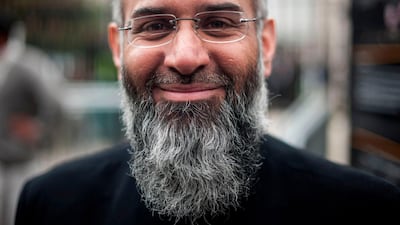British hate preacher Anjem Choudary has returned to his east London home amid warnings that that the extremist group he once led is stirring back to life.
Mr Choudary, 52, was freed from prison in October after serving three years in prison for supporting ISIS but was initially ordered to stay at a probation hostel under strict conditions.
He was pictured back in his east London neighbourhood on Monday but declined to speak with a reporter from the Daily Telegraph, owing to the restrictions on his activities aimed at preventing him from influencing young British Muslims.
Other senior members of the group have also been released in the last six months after serving jail terms following a concerted campaign against the group by British authorities.
The National reported last year that Mr Choudary faced more than 20 conditions on his freedom, including a ban from contacting other extremists, with any breaches likely to see him returned to prison to serve the remainder of his sentence.
Several hundred followers of his group, Al Muhajiroun, travelled abroad to join extremist groups in countries including Iraq and Syria or remained in the UK to commit terrorist acts.
The group’s followers included those responsible for the July 7, 2005, attacks on the London transport network that killed 52 people and the murder of Lee Rigby, a British soldier, who was run down and attacked by two Britons.
Anti-extremism campaigners Hope Not Hate warned in their “State of Hate report” for 2019 that “Britain’s most prolific and dangerous extremist group is stirring back into life after two years of relative silence”.
The group said Al Muhajiroun was starting to emerge again “albeit on a much smaller and more tentative scale” with street stalls in east London and social media appearances by some of its most prominent members.
“While Choudary himself will not be able to have any contact with any of his old Al Muhajiroun associates, his release will obviously act as a spur for others,” it said, warning that younger leaders would become more active to impress Mr Choudary.
Mr Choudary, a former lawyer, was the co-founder of Al Muhajiroun with Omar Bakri Mohammed, a former Hizb ut-Tahrir activist deported from Saudi Arabia in 1985.
Prime Minister Theresa May said the authorities were well-equipped to deal with Mr Choudary after his release.

